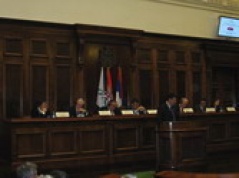National Assembly of the Republic of Serbia / Activities / Activity details

Thursday, 25 October 2007
ROSE-ROTH SEMINAR HELD AT THE NATIONAL ASSEMBLY HOUSE
The 67th Rose-Roth Seminar, organised by the NATO Parliamentary Assembly in cooperation with the National Assembly of the Republic of Serbia was held in Belgrade from 25 to 27 October.
The 67th Rose-Roth Seminar, organised by the NATO Parliamentary Assembly in cooperation with the National Assembly of the
The main topic of the seminar was “
The participants of the seminar were greeted by Miloljub Albijanic, Vice-chairman of the National Assembly, as host. Marko Djurisic, Head of the Standing Delegation of the National Assembly to the NATO PA was the moderator of the opening session.
Addressing those present Vice-chairman Albijanic pointed out that
At the beginning of the proceedings those present were addressed by Jose Lello, NATO Parliamentary Assembly President. He warned of the danger for stability in the region if the state of affairs in Kosovo and Metohija is not resolved, because the dangerous situation might spread to all neighbouring countries. The solution of the future status of Kosmet is not a military, but a political issue and the
Kai Eide, Political Director of the Ministry of Foreign Affairs of the
Judy Batt from the European Institute for Security Studies talked about the relations of the West Balkans and Europe and achieving stability in the region through integrations, and Jaroslaw Skonieczka, Director of the NATO Euro-Atlantic Integration and Partnership Directorate, also spoke about
***
Kosovo and the Hague Tribunal were the focus of attention on the second day. Talking on the determination of the final status of Kosovo, Steven Schook, Deputy Head of UNMIK stated that the existing status is not sustainable adding that UNMIK believes in the UN Security Council Resolution 1244, as well as Kai Eide’s report which says that the process must be concluded. UNMIK expects precise decisions and recommendations of the mediators’ trio, said Schook expressing his expectation that
Ljubomir Kljakic, Deputy Minister for Kosovo and Metohija, stated that a unilateral declaration of Kosovo independence is not the necessary outcome of the Province’s status, but it is a probable one and warned that if
Talking about whether multiethnical Kosovo is possible, Dusan Janjic, Director of the Forum for Ethnic Relations, said that in the Kosovo reality ethnic communities are confronted and divided and that there is a clash for territorial control in Kosovo. He particularly warned that not solving the status of Kosovo also has consequences in
Goran Bogdanovic, Member of the National Assembly and Provisional Assembly of the UNMIK/Kosovo and member of the negotiation team, stressed that Serbia’s proposal of decentralisation does not represent a division on ethnical principles but a support of multiethnicity, that is that municipalities with a Serbian majority have 30% of inhabitants of other nationalities.
Carla del Ponte, Chief Prosecutor of the Hague Tribunal took part in the seminar, talking about
Rasim Ljajic, National Coordinator for the co-operation with the Hague Trubinal also talked on this subject. He repeated that there is a political resolve in
***
On the third day, the participants of the seminar talked about the reform of
Talking about the Serbian Defence System Reform, Boland stated that a lot has been done so far, but reminded all present that bills on defence and the army have not yet been passed. The NATO Alliance is very active in the Serbian Defence System reform process, the military alliance’s official said stressing the importance of the armed forces being efficient and under democratic control.
In his address, Minister Sutanovac stated that during the reform processes in the Serbian Military the defence capacities of the country have been raised to a generally acceptable level and that all the processes have been done so as set the Serbian defence system on par with new challenges and threats. He pointed out that the creation of an economically sustainable defence system under a democratic and civil control, able to join integrational processes, is also the reason for undertaking reform. Emphasising that the goal of the reforms if the creation of an efficient, modern and less numerous army, Sutanovac also stressed the necessity of passing suitable legal and normative acts.
Chief of General Staff of the Serbian Armed Forces, Zdravko Ponos said that in the upcoming period the priorities of the military reform will be directed towards the improvement of training, complete professionalisation, technical modernisation and improvement of the social position of the members of the military.
About 140 representatives of 20 member countries and associate members of the NATO Parliamentary Assembly, as well as representatives of a large number of ministries, international organisations and institutions, embassies, institutes, and non-government institutions took part in the seminar.




